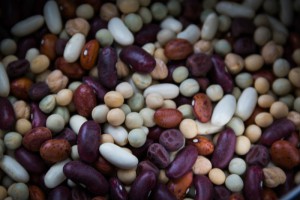Every parent is concerned about their child’s health and wants the best for them. When introducing solid foods, they have many questions about ensuring that their baby has everything they need to grow and develop.
Concerning the ideal time to integrate solid foods and which types you should start with, along with some practical advice for doing so, go to Baby Diet: When Should Solid Foods be Introduced? This entry will focus on a baby’s iron needs over time and based on their growth.
Why is iron important?
Everyone needs iron, which is a mineral that promotes normal growth of the brain, helps transport oxygenation in the blood to the body’s cells, and is an important part of hemoglobin (blood component, red blood cells). Over the long-term, a deficiency will impact structures, different systems in the human body, and even organ function. The impact can be both motor and neurological. When considering the rapid growth of a baby during their first year of life, it’s easy to see the high risks associated with an iron deficiency during this evolution period.
Nutritional Recommendations for Iron
Even if the mother is still breastfeeding their six-month-old baby, Health Canada and the Institut national de santé publique du Québec recommend introducing foods rich in iron. Babies will have used up their iron reserves received from their mother during childbirth. Their fast growth requires an increase in iron intake, which can’t be met with their mother’s milk (Health Canada: Nutrition for healthy term infants, birth to six months [2012]). For a six to twelve-month-old infant, the quantity of breast milk or infant formula must be about 720 ml to 960 ml (24 oz to 32 oz) per day. For a baby fed with formula, it must have at least 10 mg to 12 mg/iron per litre, and even more in some cases.
 With this in mind, do you understand why we suggest adding meats to a baby’s diet after six months? This food group will have the biggest impact on iron rates in your baby’s blood. Meat is also a source of protein, vitamins and zinc. In addition to meat, you can use meat substitutes like eggs, tofu and legumes. Infant cereals enriched with iron are a great choice when introducing solids to your baby. They will help meet their nutritional needs for their fast growth.
With this in mind, do you understand why we suggest adding meats to a baby’s diet after six months? This food group will have the biggest impact on iron rates in your baby’s blood. Meat is also a source of protein, vitamins and zinc. In addition to meat, you can use meat substitutes like eggs, tofu and legumes. Infant cereals enriched with iron are a great choice when introducing solids to your baby. They will help meet their nutritional needs for their fast growth.
Health Canada even approves meat as a first food to give a baby when starting their solid food diet at six months. This recommendation has been around for the past several years to increase iron intake. Babies are also able to handle meat at this age. But it hasn’t really become widely adopted by parents, as they’re still culturally used to starting with cereals, vegetables or fruit. If you start solid foods between four and six months, start with cereals enriched with iron, fruit and vegetables. Once they reach six months, meat or meat substitutes should be added to their diet quickly.
Foods Rich in Iron
Many foods rich in iron are available, and you can find a few of the best ones below. Vitamin C (citrus, strawberries, cantaloupe, tomatoes, broccoli, peppers) help iron absorption in the body, as does combining meat and legumes or fish or eggs.
In descending order (highest to lowest), here’s the iron content of different foods:
- Meat (beef, pork, veal, lamb. Brown meat has more iron than white);
- Poultry (turkey contains 70% more iron than chicken);
- Fish (haddock, salmon, cod, tilapia, etc. Please note that iron content in haddock is 0.7 mg/4 tbsp, versus 0.2 mg for the same amount of salmon and most other fish);
- Baby cereals enriched with iron. These contain from 5 mg to 7 mg/iron per 5 tbsp;
- Legumes (beans, lentils, chickpeas, etc.). Legumes have between 2.6 g and 4.9 g of iron per ¾ cup;
- Tofu (firm). It contains from 1.2 mg to 2.4 mg/iron per 150 g;
- Whole eggs (there are no longer restrictions for babies over six months). Eggs contain 1.2 mg to 1.8 mg of iron per two large eggs.
Milk and dairy products can harm the absorption of iron if excessively consumed by the baby. This is because calcium interferes with iron assimilation and absorption. This is even more important to consider after nine months of age. When they start consuming 3.25% cow milk, which is low in iron, the baby will feel more satiated and won’t want to eat foods rich in iron. Cow milk can also provoke gastrointestinal blood loss in infants associated with intestinal irritation. This will lead to iron loss.
Iron needs vary for each individual. But nutritional recommendations have been established by credible health organisations to meet the vast majority of the population’s iron needs based on sex and age. Since we can’t know the specific needs of each person, to prevent deficiencies, everyone, from growing babies to adults, needs to meet recommended nutritional intake levels.
For babies under 1, solid foods supplement breast milk or infant formulas to meet recommended nutritional intake. Animal iron sources (ex.: beef, turkey, chicken, lamb, veal, fish, seafood) absorb in the blood faster than iron in eggs and vegetable sources (ex.: legumes). A baby needs to eat two meals a day with iron-rich foods to meet their needs. Just to give you an idea, a baby’s iron needs, 8 mg/day, are higher than an adult male’s needs. From seven to 12 months, the baby needs 11 mg of iron/day according to Health Canada’s (and other sources) nutritional recommendations. For a vegetarian diet in infants, the iron intake should be doubled, i.e., 22 mg per day. Iron recommendations can be higher for women, 18 mg/day, given their monthly menstruation cycle. Once again, individual iron needs can vary depending on the person.
Iron Deficiencies and Anemia in Babies Under 1 Year
Iron deficiency and anemia is the most widespread deficiency in babies under 1 year of age. Over the long-term, iron deficiencies lead to iron-deficiency anemia.
The World Health Organisation defines iron deficiencies as “a state in which iron is insufficient to maintain the physiological functioning of blood, cerebral and muscle tissues.”
The role of iron:
- Enables the synthesis of hemoglobin to ensure the transport of oxygen in the blood to the body’s tissues;
- Facilitates the synthesis of DNA;
- Aids in the development of the immune system;
- Contributes to the development of the central nervous system.
Iron deficiencies are sometimes hard to identify because the symptoms are often very general in nature. Alone, proper diet can solve the situation and prevent an anemia diagnosis. Here are a few signs that can indicate an iron deficiency:
- paleness;
- irritability;
- fatigue;
- low appetite;
- slower development (walking later, etc.);
- lower attention levels;
- at this stage, growth curves for weight and size can remain normal.
Main causes of anemia:
- Insufficient intake;
- Difficulty absorbing;
- Blood loss.
However, when talking about anemia (iron-deficiency anemia) the affliction is more serious, with long-term impacts on motor, neurological, cognitive and behavioural development. We also note that, in the long term, there are more episodes of infections and learning and concentration difficulties at the school level. This is directly linked to the major impact of insufficient hemoglobin concentrations. Blood tests can be required to better diagnose anemia when in doubt, along with a full physical exam and an examination of family and medical history.
What babies are at higher risk for anemia?
Some babies will be more predisposed to anemia than others. Health professionals will be more vigilant screening for this affliction to lessen the medium- and long-term impacts. Here are known risk factors for babies under 1 year:
- premature birth;
- low birth weight (under 3,000 g);
- exclusively breastfed after six months (no addition of foods rich in iron);
- vegetarian diet;
- drinks infant formula low in iron (under 7 mg of iron/1,000 ml);
- drinks 3.25% milk before nine months;
- drinks too much milk and don’t eat enough solids rich in iron;
- the mother had an iron deficiency during pregnancy;
- the mother is diabetic;
- the mother drank too much alcohol during pregnancy.
During postnatal medical monitoring of a baby at high risk for anemia, as a preventative measure, the caregiver could suggest iron supplements (drops) for the baby. Then, when introducing solids, the dietary intake of foods rich in iron will be promoted, along with the supplement, to compensate for their growing iron needs. The recommended iron intake for an infant between 7 and 12 months is 11 mg per day.
How to Increase Iron in an Infant’s Diet
Different ways to increase iron in an infant’s diet are possible. For example:
- In a recipe, replace half the flour by twice the quantity of iron-enriched baby cereals. So, for 1 cup of flour add 2 cups baby cereal (to replace the second cup of flour). You can do this for crepes, cookies and prune or banana bread, for example;
- replace breadcrumbs in meatloaf or meatballs with baby cereals enriched with iron;
- thicken soups with baby rice cereal with iron;
- the best source of dietary iron is from animal sources (the bioavailability in the blood is 20% for redistribution throughout the body, while plant sources are at 5%);
- when the baby eats, legumes and quinoa are good alternatives, along with fruits and vegetables that contain vitamin C, which increases iron absorption.
Treating Anemia with Iron Supplements
Like with many treatments, treating a baby’s anemia with iron supplements can come with possible side effects, and here are a few:
- constipation;
- greyer teeth;
- must be taken on an empty stomach;
- can lead to gastric disorders (discomfort, gas, bloating).
These supplements will likely be taken over a long period, as the baby’s needs increase quickly during the first year. They may not always be very cooperative when taking it. It can also impact the family budget, because supplements aren’t always covered by insurance plans.
We hope that this article has provided you with a good summary of the importance of iron for your baby and how to prevent anemia. This information will help you give your baby everything they need for their proper growth and development.
Talk soon,
Marie Fortier
The Baby Expert
Article updated in November 2024.
Sources: Training day in gastroenterology at CHU Sainte-Justine, November 2024 Dr. Jessica Breton, Department of Gastroenterology, Nutrition, and Hepatology, CHU Sainte-Justine (conférence: Carence en fer et Anémie ferriprive chez l’enfant).



